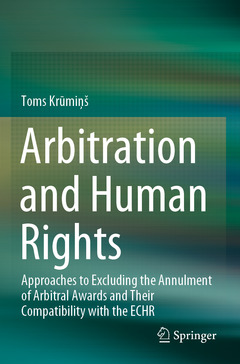Arbitration and Human Rights, 1st ed. 2020 Approaches to Excluding the Annulment of Arbitral Awards and Their Compatibility with the ECHR
Auteur : Krūmiņš Toms

This book presents a creative synthesis of two ostensibly disparate fields of law ? arbitration and human rights. More specifically, it focuses on various legislative approaches to excluding the annulment of arbitral awards (setting-aside proceedings) at the seat of arbitration and evaluates the compatibility of such approaches with the European Convention on Human Rights (ECHR), in particular the right to a fair trial under Article 6(1).
The book first assesses the applicability and impact of the ECHR, in particular Article 6(1), on international commercial arbitration. It then analyses a number of legislative approaches to excluding setting-aside proceedings, focusing on two synergetic phenomena ? exclusion agreements and the total lack of setting-aside proceedings in national arbitration law. Lastly, the book investigates to what extent the lack of setting-aside proceedings in national arbitration law may lead to a violation of arbitrating parties? right to a fair trial under Article 6(1), and puts forward certain de lege ferenda recommendations on how to best approach the regulation of setting-aside proceedings in national arbitration law from the standpoint of compliance with the ECHR.
1.1. Setting the Scene
1.2. Organization of the Book
2. The ECHR: In Brief Perspective
2.1 A General Overview
2.2 The ECHR’s Enforcement Mechanism
2.3 Admissibility of Individual Applications
2.3.1 Procedural Grounds of Inadmissibility
2.3.2 Grounds of Inadmissibility Relating to the Court’s Jurisdiction
2.3.3 Grounds of Inadmissibility Relating to Merits
2.4 Interpretation of the ECHR
2.4.1 General Rules of Interpretation
2.4.2 The Object and Purpose of the Convention
2.4.3 Evolutive Interpretation
2.4.4 Common Standards
2.4.5 Margin of Appreciation
2.4.6 Proportionality and Fair Balance
2.4.7 Other Principles of Interpretation
2.5 Member States’ Obligations under the ECHR
2.5.1 Positive Obligations
2.6 Summary
3. Arbitration and the ECHR
3.1 Introduction
3.2 Arbitration and the ECHR: Approaches of Application
3.2.1 Absolute Non-Applicability
3.2.2 Direct Applicability
3.2.3 Indirect Applicability
3.3 ECHR Provisions and Their Applicability to Arbitration
3.3.1 Article 6(1) of the ECHR and the Right to a Fair Trial3.3.2 Other ECHR Provisions
3.4 Arbitration Agreement – A Waiver of the Convention’s Rights?
3.4.1 Arbitral Tribunals and the ECHR
3.4.2 Arbitration Agreement as a Waiver of the Rights of Article 6(1) of the ECHR
3.4.3 Permissibility of a Waiver
3.5 Formal Conditions of a Valid Waiver
3.5.1 The Condition of Absence of Constraint
3.5.2 The Condition of Unequivocality
3.5.3 The Condition of Lawfulness
3.5.4 The Condition of Minimum Safeguards
3.5.5 The Condition of Public Interest
3.6 Summary
4. Setting-Aside Proceedings – Overview, Genesis and Grounds for Annulment
4.1 Overview and Genesis of Setting-Aside Proceedings
4.2 Theoretical Considerations
4.3 Sources and Jurisdiction, Time-limits and Decisions Subject to Annulment4.4 The UNCITRAL Model Law
4.4.1 Article 34 of the UNCITRAL Model Law and Grounds for Annulment
4.5 Summary
5. Approaches to Excluding the Annulment of Arbitral Awards – Exclusion Agreements
5.1 Introduction
5.2 Switzerland
5.2.1 Overview of the Provision
5.2.2 Prerequisites
5.2.3 Effects and Consequences
5.2.4 Article 192(1) of the PILA and the ECHR
5.3 France
5.3.1 Overview of the Provision
5.3.2 Prerequisites
5.3.3 Effects and Consequences
5.4 Sweden
5.4.1 Overview of the Provision
5.4.2 Prerequisites
5.4.3 Effects and Consequences
5.5 Belgium
5.5.1 Overview of the Provision
5.5.2 Prerequisites
5.5.3 Effects and Consequences
5.6 Other States
5.6.1 The Liberal Approach
5.6.2 The Restrictive Approach
5.6.3 The Intermediate Approach
5.7 Summary
6. Approaches to Excluding the Annulment of Arbitral Awards – Total Exclusion
6.1 Introduction
6.2 Belgium
6.3 Malaysia
6.4 Kyrgyzstan
6.5 Latvia
6.5.1 Arbitration in Latvia – A Brief Summary
6.5.2 Total Lack of Setting-Aside Proceedings in the Latvian Arbitration Law
6.6 Summary
7. Approaches to Excluding the Annulment of Arbitral Awards and Their Compatibility with the ECHR
7.1 Introduction
7.2 Exclusion Agreements and Their Compatibility with the ECHR
7.2.1 Exclusion Agreements and the Waiver Theory - Is the ECtHR’s Decision in Tabbane v. Switzerland Set in Stone?7.2.2 Permissibility of Exclusions Agreements – Non-Waivable Rights of Article 6(1) of the ECHR and Their Relation to Setting-Aside Proceedings
7.3 Total Exclusion of Setting-Aside Proceedings – Permissible under the ECHR?
7.3.1 Total Exclusion of Setting-Aside Proceedings and the Waiver Theory
7.3.2 Total Exclusion of Setting-Aside Proceedings and the Right of Access to a Court
7.3.3 Interim Conclusion
7.4 Summary
8. Conclusion
Provides a comprehensive, up-to-date analysis of the applicability of the ECHR to international commercial arbitration
Presents a comparative overview of various legislative approaches to voluntary exclusion agreements
Addresses the interplay between setting-aside proceedings and parties’ procedural human rights under the ECHR
Puts forward original conclusions regarding the continuing necessity and relevance of setting-aside proceedings in the contemporary framework of international commercial arbitration
Date de parution : 08-2021
Ouvrage de 334 p.
15.5x23.5 cm
Disponible chez l'éditeur (délai d'approvisionnement : 15 jours).
Prix indicatif 158,24 €
Ajouter au panierDate de parution : 08-2020
Ouvrage de 334 p.
15.5x23.5 cm
Disponible chez l'éditeur (délai d'approvisionnement : 15 jours).
Prix indicatif 158,24 €
Ajouter au panier


